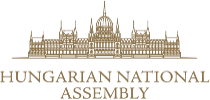Annex 1 to General Assembly Resolution No 1/2022 (VII.04.)
Statutes of the
Hungarian National Group of the Inter-Parliamentary Union
I. Objectives, tasks
Article 1 The objective of the Inter-Parliamentary Union (hereinafter referred to as ’IPU’) is to promote relations among the Members of all Parliaments organised into national groups, with a view to encouraging the active participation of their Parliaments and States in the promotion of international peace and co-operation.
Article 2 Bearing in mind the objectives set out under Article 1, the IPU expresses a view on all international matters that may be settled via parliamentary channels, and puts forth proposals for the establishment and development of strong democratic parliamentary institutions; ways to contribute to peace-building, the prevention of conflicts and international security; the development of means that support gender equality and respect for women's rights; the promotion and protection of human rights; ways to involve young people into political life; as well as the mobilisation of national parliaments to support the effective implementation of the global development agenda.
Article 3 The aim of the Hungarian National Group of the IPU (hereinafter referred to as the ‘National Group’) is to connect Hungarian legislation to the work of the IPU. The task of the National Group is to inform the National Assembly and the Government of the rulings of the IPU and, should the Parties agree, encourage their enforcement and regularly inform the IPU Secretariat in Geneva of the operation of the National Group and the results achieved by it.
II. Membership
Article 4 The National Group is established by way of a Parliamentary Resolution at the start of each parliamentary term, which states that the National Assembly declares itself to be a Member Institution of the IPU.
Article 5 The National Assembly is a member of the IPU in its capacity as a body, thus all Members of the National Assembly are also Members of the National Group.
III. Bodies
Article 6 Bodies of the National Group:
a) the General Assembly,
b) the Board, and
c) the Secretariat.
The General Assembly
Article 7 The decision-making body of the National Group is the General Assembly, composed of all the Members.
Article 8 The session of the General Assembly is convened by the Speaker of the National Assembly on the initiative of the President of the National Group (hereinafter referred to as the ‘President’), following a decision by the Board. The inaugural session of the General Assembly is convened by the Speaker of the National Assembly and is chaired by the Speaker or the Deputy Speaker of the National Assembly.
Article 9 The General Assembly meets at least once a year in the Plenary Chamber of the National Assembly.
Article 10 The General Assembly is chaired by the President or, should he/she be held up by other obligations, by the Vice President designated by him/her.
Article 11 The General Assembly
a) Elects the President, the First Vice President and the Vice President(s),
b) Adopts or rules to amend the Statutes of the National Group,
c) Listens to the Board’s briefing once a year on its future work plan, as well as to its report on the realisation of the previous year's programme.
Article 12 A quorum is required for decisions regarding the composition of the Board of the National Group and for the adoption or amendment of the Statutes.
Article 13 The General Assembly has quorum if more than half of the Members of the General Assembly are present. Decisions of the General Assembly are taken by way of a majority vote of more than half of the Members present. The General Assembly has capacity to deliberate if more than one third of the Members of the General Assembly are present. The capacity to deliberate is only established at the express request of any Member of the General Assembly.
The Board
Article 14 The Board consists of the President, the first Vice President and the Vice President(s). Members of the Board are proposed to the Speaker of the National Assembly by the Leaders of the Hungarian National Assembly’s political groups.
Article 15 The President and the first Vice President are nominated by the most populous Group of MPs. Additional Vice Presidents are proposed by way of a joint motion put forth by the Leaders of the parliamentary groups, or, in the lack of such a motion, by the Speaker of the National Assembly, based on an assessment of the proposals of individual parliamentary groups. The position of the Vice President may be filled alternately for a fixed term by multiple Members with membership in individual parliamentary groups, subject to the request to this end of the Leader of (a) political group(s).
Article 16 The term of office of a Board Member ends:
a) Upon the termination of the MP’s mandate,
b) Upon their resignation or dismissal from the political group,
c) If the political group of which they are a member ceases to exist,
d) Upon resignation from their position,
e) Upon being recalled by their political group of MPs, recall by the Group of MPs,
f) At the end of the term of office of the Vice President elected under an alternating scheme, in accordance with Article 15,
g) By way of a decision of the General Assembly made pursuant to Article 13, based on the proposal to that effect of the Speaker of the National Assembly.
Article 17 Except in the case provided for in Article 16(f), in the event of the termination of the term of office of a Board Member, the Leader of the political group that had proposed his/her election puts forth a proposal for a new Board Member without delay. If necessary, an extraordinary General Meeting is to be convened for the election of a new Board Member.
Article 18 The Board
a) On its initiative, the President puts forth a proposal to the Speaker of the National Assembly for the National Group’s annual international programme;
b) Ensures the representation of the National Group at diplomatic events held in Hungary; when receiving inbound delegations, as well as at IPU’s international General Assemblies and other special events;
c) Liaises with the IPU’s Secretariat in Geneva and its New York Office accredited to the UN, and supplies the IPU with the information referred to in Article 3;
d) Co-ordinates among political groups in the process of preparing proposals for the establishment of regional friendship caucuses and bilateral friendship groups and the nomination of their leadership members. Political groups that do not have a representative in the Board may delegate a representative with consultative powers to the Board’s discussion meeting involving the National Assembly’s regional friendship caucuses and bilateral friendship groups;
e) On its initiative, the President makes a proposal for the establishment, composition and leadership members of regional friendship caucuses and bilateral friendship groups, to be approved by the Speaker of the National Assembly;
f) Informs the General Assembly of the future work plan and reports on the implementation of the previous year's programme;
g) Decides on the amount of the annual membership fee payable by the Members of the National Group to support the operation of the National Group, and, once a year, listens to the report of the President on costs and the utilisation of resources;
h) Performs all other tasks not assigned to the General Assembly.
Article 19 The Board has quorum where more than half of Board Members attend the session. The Board makes decisions unanimously. In the absence of consensus, the President has the casting vote.
Article 20 Board meetings are convened by the President. The President has the power to take measures falling within the scope of Article 18(b) and (c) outside the sessions of the Board, subject to the obligation to report to the Board retrospectively. The President approves the use of the budget consisting of annual membership fees set by the Board in line with Article 18(g).
Article 21 The President is the Head of the IPU Board’s Multi-Party Delegation participating in international IPU events, and the First Vice President is the Deputy Head of the delegation.
The Secretariat
Article 22 The tasks falling within the competence of the National Group’s Secretariat are performed by the IPU Secretariat of the Directorate for Foreign Affairs of the Office of the National Assembly. The IPU Secretariat is tasked with the preparation, on-site support and follow-up of the Board’s participation in IPU General Assemblies and special conferences, as well as with the organisation, preparation and follow-up the diplomatic meetings in Hungary of Board Members in their capacity as President or Vice President.
Article 23 The Secretary of the National Group participates in the General Assembly, in Board meetings and in the international events of the IPU as Secretary of the Hungarian Delegation.
IV. Financial provisions
Article 24 In order to support the operation of the National Group, Members of the National Group pay an annual membership fee in the amount set by the Board, to be deducted in two instalments from the honorary fees payable to Members in the year of the general election of Members of Parliament. The utilisation of the resulting annual budget is recorded by the Department of Finance of the Office of the National Assembly.
Article 25 The National Group pays an annual membership fee to the Inter-Parliamentary Union for its membership in the IPU, from the budget of the National Assembly, in an amount to be set by the IPU. The National Assembly also pays an annual membership fee to the IPU’s Twelve Plus Geopolitical Group.
Article 26 The President receives an honorary fee in accordance with Article 105(2) of Act XXXVI of 2012 on the National Assembly.
Article 27 The official foreign trips of Board Members and Members of the National Group are authorised by the Speaker of the National Assembly.
V. Further provisions
Article 28 When the mandate of the National Assembly ceases, the mandate of the National Group also ceases. Until the election of a new Board, the powers of the Board are exercised, in urgent matters, by the Speaker of the National Assembly.
The Statutes were adopted by the General Assembly at its inaugural meeting on 4 July 2022.




